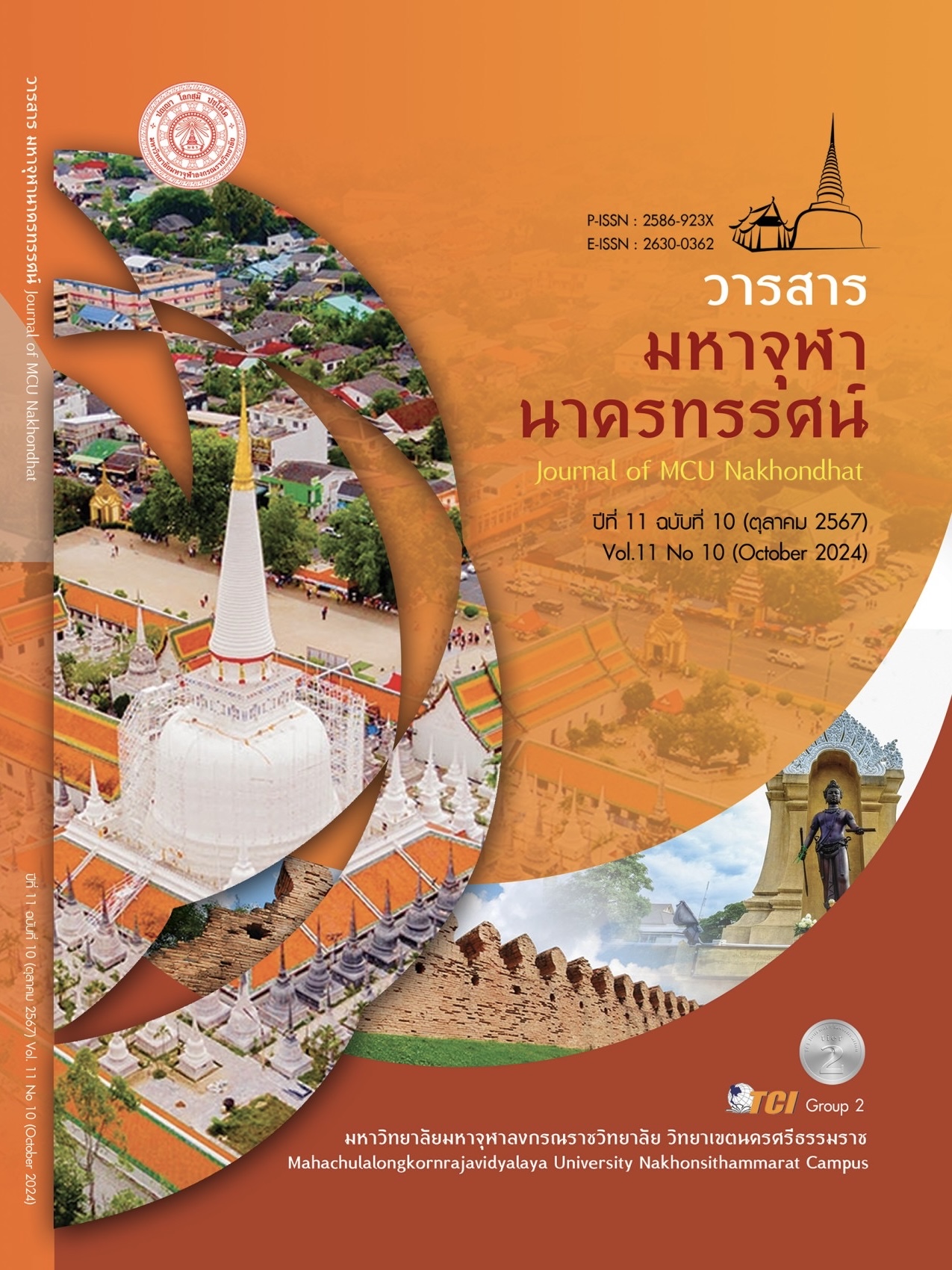AN APPLICATION OF GHARAVASADHAMMA 4 IN FAMILY DEVELOPMEN OF BAN KRONG PRAP COMMUNITY, KHLONG NOI SUBDISTRICT, CHAI BURI DISTRICT, SURAT THANI PROVINCE
Main Article Content
Abstract
The objectives of the study were 1) To study the concept of family development of the Ban Klong Prap community, Klong Noi Subdistrict, Chaiburi District, Surat Thani Province, 2) To investigate the principle of Garavasadhamma 4 in the Theravada Buddhist scriptures, 3) To apply the principle of Garavasadhamma 4 in the development of the family of the Ban Klong Prap community, Klong Noi Subdistrict, Chaiburi District, Surat Thani Province. It isa qualitative research using in-depth interviews and presented in a descriptive writing. Findings were as follows: 1) The concept of family development is to promote the family to have a good quality of life between father, mother, children and the clan to be sustainable and stable. It focuses on promoting careers so that the family can rely on themselves, promoting health for family members when they are sick or entering old age, and promoting mental strength with morality and ethics to develop the mind. 2) The principle of Garavasadhamma 4 that appear in the Theravada Buddhist scriptures are the principles of teaching for layman's household life, namely, truthfulness, honesty, self-control, patience, and generosity. They are teachings based on the path of household life to lead to family warmth. 3) The application of the principle of Garavasadhamma 4 makes living together in the family and with other people happy, without disputes, with a progressive life without defects and free from vices, able to perform duties effectively and creating happiness and unity for the family. Therefore, applying the principle of Garavasadhamma 4 to solve family problems is a way to help dissolve family conflicts, resulting in family members living together in warmth, and society and the country developing well.
Article Details

This work is licensed under a Creative Commons Attribution-NonCommercial-NoDerivatives 4.0 International License.
References
คณะกรรมการวิชาศิลปะการดำเนินชีวิต ศูนย์วิชาบูรณาการ หมวดวิชาศึกษาทั่วไป. (2553). ครอบครัวกับศิลปะการดำเนินชีวิต. (พิมพ์ครั้งที่ 10). กรุงเทพมหานคร: สำนักพิมพ์มหาวิทยาลัยเกษตรศาสตร์.
ณัฐรดา แฮคำ. (2564). การส่งเสริมความรัก ความอบอุ่น ความเอาใจใส่ในครอบครัวและชุมชนเชิงพุทธ. วารสาร มจร มนุษยศาสตร์ปริทรรศน์, 7(1), 481-497.
ทวี บุญยเกตุ. (2543). การครองเรือน. กรุงเทพมหานคร: ห้างหุ้นส่วนจำกัด กิจศึกษาเทรดดิ้ง.
พรรณทิพย์ ศิริวรรณบุศย์. (2545). จิตวิทยาครอบครัว. (พิมพ์ครั้งที่ 5). กรุงเทพมหานคร: สำนักพิมพ์แห่งจุฬาลงกรณมหาวิทยาลัย.
พระธรรมปิฎก (ป.อ.ปยุตฺโต). (2542). การศึกษาทางเลือก: สู่การวิวัฒน์หรือวิบัติในยุคโลกไร้พรหมแดน. กรุงเทพมหานคร: มูลนิธิพุทธธรรม.
พระพรหมคุณาภรณ์ (ป.อ.ปุยตฺโต). (2555). คู่มือชีวิต. (พิมพ์ครั้งที่ 26). นนทบุรี: Awakebooks.
พิจิตร พงษ์เกษ์ และคณะ. (2563). หลักฆราวาสธรรมกับการครองเรือน. วารสารวิชาการธรรมทรรศน์, 20(4), 156-172.
มนทกานติ์ รอดคล้าย. (2561). อิทธิพลของความรักความเข้าใจในครอบครัวต่อคุณธรรมจริยธรรมของเด็กและเยาวชนไทย. ใน วิทยานิพนธ์ศิลปศาสตรดุษฎีบัณฑิต สาขาวิชาประชากรศาสตร์. วิทยาลัยประชากรศาสตร์ จุฬาลงกรณ์มหาวิทยาลัย.
มหาวิทยาลัยมหาจุฬาลงกรณราชวิทยาลัย. (2559). มนุษย์กับสังคม = Man and Society. (พิมพ์ครั้งที่ 3). พระนครศรีอยุธยา: สำนักพิมพ์มหาวิทยาลัยมหาจุฬาลงกรณราชวิทยาลัย.
ส.ผ่องสวัสดิ์. (2551). ครอบครัวอบอุ่น. (พิมพ์ครั้งที่ 5). กรุงเทพมหานคร: รุ่งศิลป์การพิมพ์.


